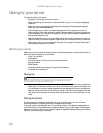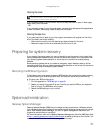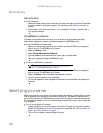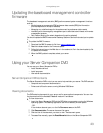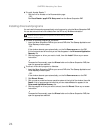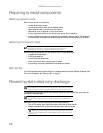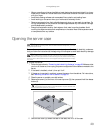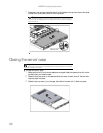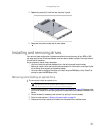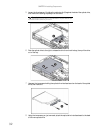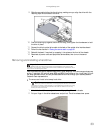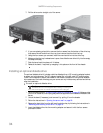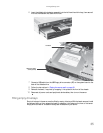
CHAPTER 4: Installing Components
28
Preparing to install components
Selecting a place to work
Work on your server in an area that:
• Is clean (avoid dusty areas).
• Is a low-static environment (avoid carpeted areas).
• Has a stable surface on which to set your server.
• Has enough room to place all of your server parts.
• Is near a grounded outlet so you can test your server after installation.
• Is near a telephone (in case you need help from Gateway Customer Care). The telephone
must be directly connected to a telephone jack and cannot be connected to your server.
Gathering the tools you need
Some tools and supplies that you may need to work on your server are:
• A notebook to take notes
• A Phillips screwdriver
• A small flat-blade screwdriver
• Small containers to store various types of screws
• A grounding wrist strap (available at most electronic stores)
Getting Help
If you have questions about performing any of these procedures, contact Gateway Customer Care.
For more information, see “Getting Help” on page 8.
Preventing static electricity discharge
The components inside your server are extremely sensitive to static electricity, also known as
electrostatic discharge (ESD).
Before working with server components, follow these guidelines:
• Turn off the server, then unplug the power cords and all other cables.
• Press the power button to drain any residual power from the server.
Tip
Blue latches, thumbscrews, or connectors indicate tool-less components.
Green latches and connectors indicate hot-swappable components.
Warning
To avoid exposure to dangerous electrical voltages and moving parts, turn off your
server and unplug the power cords and modem cable before opening the server case.
Warning
To prevent risk of electric shock, do not insert any object into the vent holes of the
power supply.
Caution
ESD can permanently damage electrostatic discharge-sensitive components
in the server. Prevent ESD damage by following ESD guidelines every time you open
the server case.



